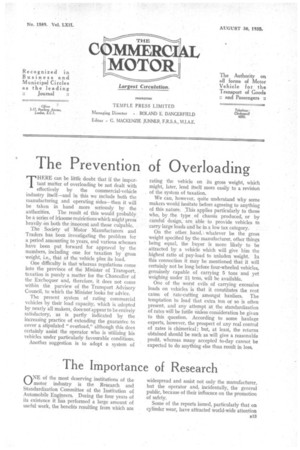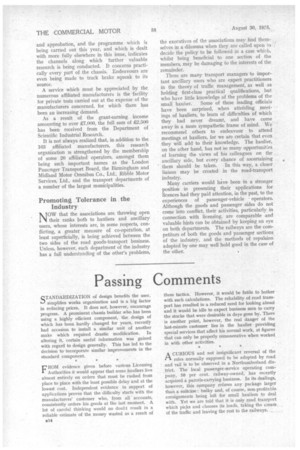The Importance of Research
Page 19

Page 20

If you've noticed an error in this article please click here to report it so we can fix it.
(-NNE of the most deserving institutions of the motor industry is the Research and Standardization Committee of the Institution of Automobile Engineers. During the four years of its existence it has performed a large amount of useful work, the benefits resulting from which are widespread and assist not only the manufacturer, but the operator and, incidentally, the general public, because of their influence on the promotion of safety.
Some of the reports issued, particularly that on cylinder wear, have attracted World-wide attention 3313 and approbation, and the programme which is being carried out this year, and which is dealt with more fully elsewhere in this issue, indicates the channels along which further valuable research is being conducted. It concerns practically every part of the chassis. Endeavours are even being made to track brake squeak to its source.
A service which must be appreciated by the numerous affiliated manufacturers is the facility for private tests carried out at the expense of the manufacturers concerned, for which there has been an increasing demand.
As a result of the grant-earning income amounting to over £7,000, the full sum of £2,500 has been received from the Department of Scientific Industrial Research.
It is not always realized that, in addition to the 163 affiliated manufacturers, this research organization is strengthened by the membership of some 20 affiliated operators, amongst them being such important names as the London Passenger Transport Board, the Birmingham and Midland Motor Omnibus Co,, Ltd., Ribble Motor Services, Ltd.. and the transport departments of a number of the largest municipalities.
Promoting Tolerance in the Industry
Now that the associations are throwing open their ranks both to hauliers and ancillary users, whose interests are, in some respects, conflicting, a greater measure of co-operation, at least superficially, is being achieved between the two sides of the road goods-transport business. Unless, however, each department of the industry has a full understanding of the other's problems, the executives of the associations may find themselves in a dilemma when they are called upon to decide the policy to be followed in a case which, whilst being beneficial to one section of the members, may be damaging to the interests of the remainder.
There are many transport managers to important ancillary users who are expert practitioners in the theory of traffic. management, as well as holding -first-class practical qualifications, but who have little knowledge of the problems of the small haulier. Some of these leading officials have been surprised, when attending meetings of hauliers, to learn of difficulties of which they had never dreamt, and have come away in a more sympathetic frame of mind. We recommend others to endeavour to attend meetings of hauliers, for we are certain that even they will add to their knowledge. The haulier, on the other hand, has not .so many opportunities of learning the views of his colleagues on the ancillary side, but every chance of ascertaining them should be taken. In this way, a closer liaison may be created in the road-transport industry.
Many carriers would have been in a stronger position in presenting their applications for licences had they paid attention, in the past, to the experiences of passenger-vehicle operators. Although the goods and passenger sides do not come into conflict, their activities, particularly in connection with licensing, are comparable and valuable hints can be obtained by keeping an eye on both departments. The railways are the competitors of both the goods and passenger sections of the industry, and the methods of repulsion adopted by one may well hold good in the case of the other.












































































